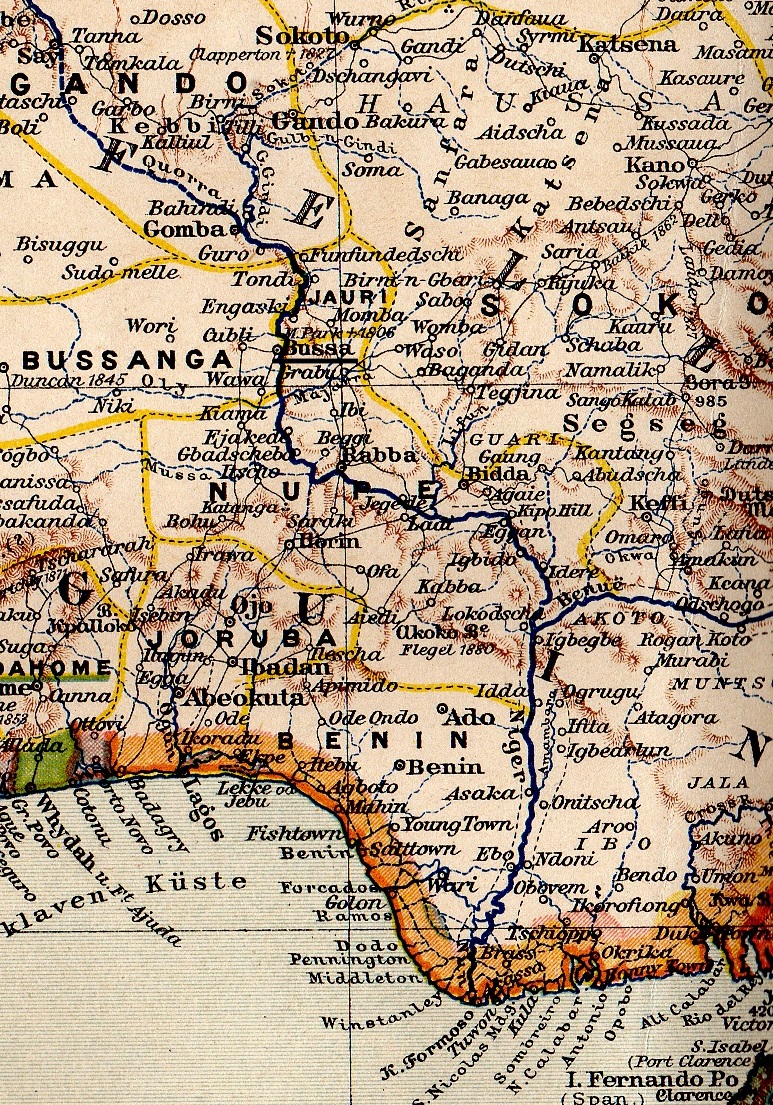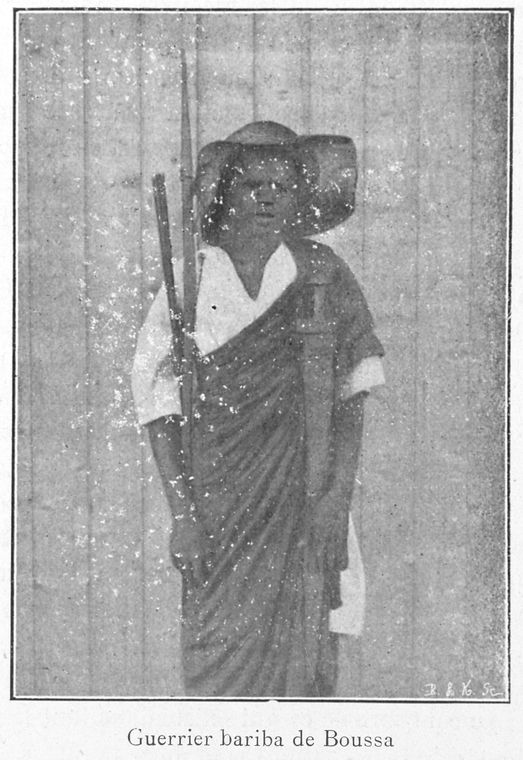|
Bussa, Nigeria
Bussa, also known as Boussa in older texts, was the capital of northern Borgu, in northern Nigeria. It was the farthest navigable point on the Niger River, just above the rapids. The town site is now covered by Lake Kainji, which was created in 1968 with the construction of the Lake Kainji dam. The town was re-located to what is now called New Bussa. History In 1806, British explorer Mungo Park drowned in Bussa while on his second expedition to trace the course of the Niger River. During 1894-1898 its possession was disputed by Great Britain and France. In 1897, Bussa became part of the British Niger Coast protectorate. The French Occupation of Bussa and Borgu has been recorded in the book ''Campaigning on the upper Nile and Niger'' by Seymour Vandeleur (i.e. Cecil Foster Seymour), published in 1898. In 1915, an uprising took place in Bussa against the British policy of indirect rule. Richard Lander Richard Lemon Lander (8 February 1804 – 6 February 1834) was a Briti ... [...More Info...] [...Related Items...] OR: [Wikipedia] [Google] [Baidu] |
Borgu
Borgu is a region in north-west Nigeria and in the northern Republic of Benin. It was partitioned between Great Britain and France by the Anglo-French Convention of 1898. People of Borgu are known as Bariba or Borgawa. History According to the Kisra legend known all over Borgu, the petty kingdoms of the country were founded by Kisra, a hero who according to an oral tradition immigrated from Birnin Kisra ("the town of Kisra") in Arabia. His brothers are said to have been the founders of the kingdoms of Illo, Bussa and Nikki. Other descendants are believed to have constituted the ruling aristocracy of the Wasangari. Colonial era During the British colonial era, the area was within the territory claimed by the Royal Niger Company, but rivalry between Britain and France for control of the trade on the River Niger led to occupation of areas by the French, for instance at Illo, and the stationing of the British West African Frontier Force at Yashikera and elsewhere in the region ... [...More Info...] [...Related Items...] OR: [Wikipedia] [Google] [Baidu] |
Nigeria
Nigeria ( ), , ig, Naìjíríyà, yo, Nàìjíríà, pcm, Naijá , ff, Naajeeriya, kcg, Naijeriya officially the Federal Republic of Nigeria, is a country in West Africa. It is situated between the Sahel to the north and the Gulf of Guinea to the south in the Atlantic Ocean. It covers an area of , and with a population of over 225 million, it is the most populous country in Africa, and the world's sixth-most populous country. Nigeria borders Niger in the north, Chad in the northeast, Cameroon in the east, and Benin in the west. Nigeria is a federal republic comprising of 36 states and the Federal Capital Territory, where the capital, Abuja, is located. The largest city in Nigeria is Lagos, one of the largest metropolitan areas in the world and the second-largest in Africa. Nigeria has been home to several indigenous pre-colonial states and kingdoms since the second millennium BC, with the Nok civilization in the 15th century BC, marking the first ... [...More Info...] [...Related Items...] OR: [Wikipedia] [Google] [Baidu] |
Niger River
The Niger River ( ; ) is the main river of West Africa, extending about . Its drainage basin is in area. Its source is in the Guinea Highlands in south-eastern Guinea near the Sierra Leone border. It runs in a crescent shape through Mali, Niger, on the border with Benin and then through Nigeria, discharging through a massive delta, known as the Niger Delta (or the Oil Rivers), into the Gulf of Guinea in the Atlantic Ocean. The Niger is the third-longest river in Africa, exceeded by the Nile and the Congo River. Its main tributary is the Benue River. Etymology The Niger has different names in the different languages of the region: * Fula Fula may refer to: *Fula people (or Fulani, Fulɓe) *Fula language (or Pulaar, Fulfulde, Fulani) **The Fula variety known as the Pulaar language **The Fula variety known as the Pular language **The Fula variety known as Maasina Fulfulde *Al-Fula ...: ''Maayo Jaaliba'' * Manding: ''Jeliba'' or ''Joliba'' "great riv ... [...More Info...] [...Related Items...] OR: [Wikipedia] [Google] [Baidu] |
Lake Kainji
Kainji Lake, in North Central Nigeria, is a reservoir on the Niger River, formed by the Kainji Dam. It was formed in 1968 and is a part of Niger State and Kebbi State. Kainji Lake National Park (KNLP), situated around the lake, is Nigeria's oldest National Park, established in 1976. Kanji Dam The Kainji Dam is situated in Northern Niger State and generates power for most towns in Nigeria. It was built from 1964 to 1968 and cost about 209 million dollars, a quarter of which was used to relocate the original population. Together with a smaller dam for a minor stream, it is long and high in the middle. It has a capacity of 12 turbines producing a total of 960 MW, but only 8 were installed, producing 760 MW. Part of the production is sold to the neighbouring country of Niger. National Park Kainji Lake National Park (KNLP) (headquarters Wawa) is situated north of Lagos, close to the border with the Republic of Benin. It comprises two sectors, Borgu Game Reserve and Zugurma Game ... [...More Info...] [...Related Items...] OR: [Wikipedia] [Google] [Baidu] |
New Bussa
New Bussa is a town in Niger State, Nigeria. It is the new site of Bussa after the Kainji Lake dam set the previous location underwater. As of 2007 New Bussa had an estimated population of 24,449. New Bussa is the headquarters of the Borgu Emirate and the Borgu Local Government Area The Borgu Local Government Area is an administrative region in Niger State, Nigeria, one of 25 Local Government Areas (LGAs) in that state, with headquarters in the town of New Bussa. The postal code is 913. The Borgu LGA was formerly part of K .... Geography New Bussa sits at , and the original town of Bussa was located about 40 km North of New Bussa at (altitude 561 ft or 170 meters). References External links * * Populated places in Niger State {{NigerNG-geo-stub ... [...More Info...] [...Related Items...] OR: [Wikipedia] [Google] [Baidu] |
Mungo Park (explorer)
Mungo Park (11 September 1771 – 1806) was a Scottish explorer of West Africa. After an exploration of the upper Niger River around 1796, he wrote a popular and influential travel book titled ''Travels in the Interior Districts of Africa'' in which he theorized the Niger and Congo merged to become the same river. He was killed during a second expedition, having successfully traveled about two-thirds of the way down the Niger. With Park's death, the idea of a Niger-Congo merger remained an open question although it became the leading theory among geographers. The mystery of the Niger's course, which had been speculated about since the Ancient Greeks and was second only to the mystery of the Nile's source, was not solved for another 25 years, in 1830, when it was discovered the Niger and Congo were in fact separate rivers. If the African Association was the "beginning of the age of African exploration" then Mungo Park was its first successful explorer; he set a standard for a ... [...More Info...] [...Related Items...] OR: [Wikipedia] [Google] [Baidu] |
Bussa Rebellion
The Bussa rebellion, also known as the Boussa rebellion, was a small insurrection in the town of Bussa against the policy of indirect rule in British-ruled Nigeria in June 1915. The rebellion was triggered by the British deposition of the local Emir of Bussa, Kitoro Gani, and his replacement with a Native Administration. The rebels attacked and killed around half of the members of the Administration, while the rest fled, leaving the rebels in control in Bussa. Despite the ongoing Kamerun campaign against the German Empire, the British were able to use a small force of soldiers which quickly suppressed the rebellion incurring no casualties. The Bussa Rebellion was the subject of a major work by British historian Michael Crowder. Background During World War I, the increased demands on the colonial state, combined with its growing shortage of manpower, put strain on British and French colonial holdings in West Africa. Uprisings in British Nigeria and French Dahomey in particul ... [...More Info...] [...Related Items...] OR: [Wikipedia] [Google] [Baidu] |
Indirect Rule
Indirect rule was a system of governance used by the British and others to control parts of their colonial empires, particularly in Africa and Asia, which was done through pre-existing indigenous power structures. Indirect rule was used by various colonial rulers: the French in Algeria and Tunisia, the Dutch in the East Indies, the Portuguese in Angola and Mozambique and the Belgians in Rwanda and Burundi. These dependencies were often called " protectorates" or "trucial states". By this system, the day-to-day government and administration of areas both small and large were left in the hands of traditional rulers, who gained prestige and the stability and protection afforded by the Pax Britannica (in the case of British territories), at the cost of losing control of their external affairs, and often of taxation, communications, and other matters, usually with a small number of European "advisors" effectively overseeing the government of large numbers of people spread over extensi ... [...More Info...] [...Related Items...] OR: [Wikipedia] [Google] [Baidu] |
Richard Lander
Richard Lemon Lander (8 February 1804 – 6 February 1834) was a British explorer of western Africa. He and his brother John were the first Europeans to follow the course of the River Niger, and discover that it led to the Atlantic. Biography Lander was the son of a Truro innkeeper, born in the Fighting Cocks Inn (later the Dolphin Inn). Educated at 'Old Pascoe’s’ in Coombs Lane, Truro, until 1817 when, aged 13, he accompanied a merchant to the West Indies, where he suffered an attack of yellow fever in San Domingo. Returning home in 1818, he gained employment as a servant to several wealthy London families with whom he travelled in Europe. Lander's explorations began as a servant to the Scottish explorer Hugh Clapperton with whom he went in 1823 to the Cape Colony, and then on to an expedition to Western Africa in 1825. Clapperton died on 13 April 1827 near Sokoto, in present-day Nigeria, leaving Lander as the only surviving European member of the expedition. He proc ... [...More Info...] [...Related Items...] OR: [Wikipedia] [Google] [Baidu] |
French West Africa
French West Africa (french: Afrique-Occidentale française, ) was a federation of eight French colonial territories in West Africa: Mauritania, Senegal, French Sudan (now Mali), French Guinea (now Guinea), Ivory Coast, Upper Volta (now Burkina Faso), Dahomey (now Benin) and Niger. The federation existed from 1895 until 1958. Its capital was Saint-Louis, Senegal until 1902, and then Dakar until the federation's collapse in 1960. History Until after World War II, almost none of the Africans living in the colonies of France were citizens of France. Rather, they were "French subjects", lacking rights before the law, property ownership rights, rights to travel, dissent, or vote. The exception was the Four Communes of Senegal: those areas had been towns of the tiny Senegal Colony in 1848 when, at the abolition of slavery by the French Second Republic, all residents of France were granted equal political rights. Anyone able to prove they were born in these towns was legal ... [...More Info...] [...Related Items...] OR: [Wikipedia] [Google] [Baidu] |


%2C_scene_at_the_river_front.jpg)
.jpg)


